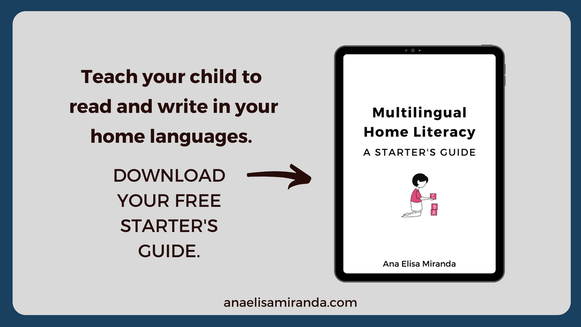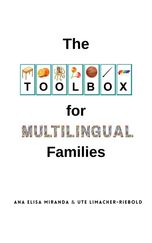How many times have you thought lately: “We need to work on their (language) skills. How can we make sure they read and write in (language)?”, but then gave in to “We simply have no time for that!”
You’re busy, the kids are busy, the days go by much too fast. They go to school, they do homework, after-school clubs, play-dates… how can you teach them to read in another language on top of all that?
And how can you do it in a way that doesn’t feel like extra work? That won’t create tension and resistance?
Well, first things first: make time. What are the time-wasters in your house? Is it too much screen time? Are they enrolled in too many extra-curricular lessons? Get organized and make your routine work in your favor.
You’re busy, the kids are busy, the days go by much too fast. They go to school, they do homework, after-school clubs, play-dates… how can you teach them to read in another language on top of all that?
And how can you do it in a way that doesn’t feel like extra work? That won’t create tension and resistance?
Well, first things first: make time. What are the time-wasters in your house? Is it too much screen time? Are they enrolled in too many extra-curricular lessons? Get organized and make your routine work in your favor.
The number one thing parents do to support their children’s literacy skills in English is reading to them and listening to them read. It’s a natural and fantastic way to learn and bond.
But you want more than bedtime stories and here are some ideas:
★Pay attention to their curiosities: are they into comics, Lego, cooking? Are they obsessed with movie characters, a specific toy, an animal? Do they like puppets, role playing, drawing, scrap-booking? Use that.
★Use technology in your favor: find apps, games and videos that promote language development and that are age appropriate. Have a screen time agreement in place.
★Have books (fiction and non-fiction), magazines, paper, chalk or whiteboard, different markers, pens and pencils easily ready - for older kids, who don’t scribble on walls anymore ;)
★In your day-to-day life, have them read and write text messages, birthday cards or even letters/emails to friends and family.
★When you call your family, ask them to read to your children and to listen to them read.
★ Siblings can read to each other at any time and anywhere.
★ Play Scrabble, crossword puzzles, hangman, word ladder, word snake, categories.
★Ask them to help you write the weekly shopping list, calendar reminders, the menu for the week or for a special occasion.
★Read anything together at different opportunities: a recipe, game instructions, a note from school, tickets, etc.
★Write a simple book review on Goodreads. See that reading list grow! Set a goal, think of a nice way to celebrate a certain number of books read.
★Start a happiness jar, where they write something that made them smile that day. When they’re feeling down they can open it and find all those happy memories!
★Older kids can start a journal.
★You can have fun conversation/writing prompts in a jar, box or bowl.
Reading and writing are better practiced with purpose. Why are they reading? For pleasure, to learn something new, to connect with someone? Why are they writing? To communicate with loved ones, to express their creativity, for practical reasons, for fun?
Reading and writing for the sake of it is not engaging or motivating. Can you recall ever learning something when you were feeling detached or resistant?
Finally, don’t stop reading to them! Older children still enjoy being read to. Pick a book that’s beyond their own reading skill, keep stimulating their comprehension, vocabulary and imagination.
★★★
Now I’m curious: how do you sneak in literacy in your multilingual home?
But you want more than bedtime stories and here are some ideas:
★Pay attention to their curiosities: are they into comics, Lego, cooking? Are they obsessed with movie characters, a specific toy, an animal? Do they like puppets, role playing, drawing, scrap-booking? Use that.
★Use technology in your favor: find apps, games and videos that promote language development and that are age appropriate. Have a screen time agreement in place.
★Have books (fiction and non-fiction), magazines, paper, chalk or whiteboard, different markers, pens and pencils easily ready - for older kids, who don’t scribble on walls anymore ;)
★In your day-to-day life, have them read and write text messages, birthday cards or even letters/emails to friends and family.
★When you call your family, ask them to read to your children and to listen to them read.
★ Siblings can read to each other at any time and anywhere.
★ Play Scrabble, crossword puzzles, hangman, word ladder, word snake, categories.
★Ask them to help you write the weekly shopping list, calendar reminders, the menu for the week or for a special occasion.
★Read anything together at different opportunities: a recipe, game instructions, a note from school, tickets, etc.
★Write a simple book review on Goodreads. See that reading list grow! Set a goal, think of a nice way to celebrate a certain number of books read.
★Start a happiness jar, where they write something that made them smile that day. When they’re feeling down they can open it and find all those happy memories!
★Older kids can start a journal.
★You can have fun conversation/writing prompts in a jar, box or bowl.
Reading and writing are better practiced with purpose. Why are they reading? For pleasure, to learn something new, to connect with someone? Why are they writing? To communicate with loved ones, to express their creativity, for practical reasons, for fun?
Reading and writing for the sake of it is not engaging or motivating. Can you recall ever learning something when you were feeling detached or resistant?
Finally, don’t stop reading to them! Older children still enjoy being read to. Pick a book that’s beyond their own reading skill, keep stimulating their comprehension, vocabulary and imagination.
★★★
Now I’m curious: how do you sneak in literacy in your multilingual home?





